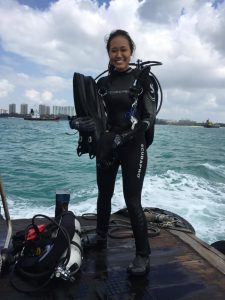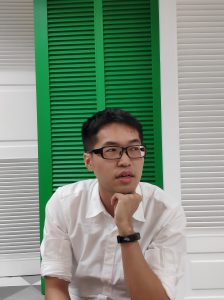In Conversation with…Our Alumni
June 21, 2021
Thriving in the workplace of tomorrow
Swift and unexpected. The impact from the pandemic accelerated the speed of change in the workplace beyond all imagination.
From a slow and steady process of digitising and integrating, many of us suddenly had to grapple with adapting to new formats of working, adopting new technology, and reskilling within a very short period of time. These changes have also given rise to new, complex problems that are too interlocked to be solved by a single discipline, and require interdisciplinary solutions by workers who can integrate multiple viewpoints and resources.
This has contributed to the highly competitive nature of the current employee market. Employers are now looking for individuals who have been trained in interdisciplinary thinking, have broad perspectives and foundational knowledge across various disciplines, and are comfortable working in cross-disciplinary teams to effectively integrate knowledge from different areas and come up with solutions.
Flexibility, adaptability, resourcefulness and interdisciplinary knowledge are the buzz words for job seekers. But how do we put these skills into practice and thrive in the workplace of today and tomorrow?
Three NUS alumni, who embarked on interdisciplinary studies during their time at NUS, and have since built strong careers on their ability to think across disciplines and adapt to changes, share their thoughts and tips.

Crystle Wee, Marine Biologist at DHI Singapore
Areas of study: Biology and Aquatic Ecology

Cliff Chew, Senior Data Analyst at Grab
Areas of study: Economics, Geography, Sociology, Statistics

Aaron Khoo, Co-Founder of Avenevv
Areas of study: Mathematics, Finance, Computing
Integrate multiple viewpoints to build solutions
“My job, which is about putting together recommendations to mitigate risk to our natural environment, requires more than simply knowing the ideal conditions for coral survivability. It is also about understanding the engineering needs for construction,” says Crystle Wee. During her time in NUS studying Environmental Studies, Crystle was exposed to modules from different faculties such as Science, Law, Arts, Social Science and Engineering.
“Studying and integrating knowledge from different modules has been essential in helping me step into the shoes of stakeholders, assess their interests and find common goals in solving environmental challenges,” she adds.
Cliff Chew, a Data Analyst at Grab who aims to make the workplace a more collaborative place through a mix of data analytics, digital technologies and social science theories, agrees with the need to be attuned to the interests of different stakeholders to find solutions that meet a shared goal.
He says, “Different stakeholders can arrive at different conclusions when looking at the same problem and data. For example, a data scientist will be concerned with model accuracy, engineers with model speed and business stakeholders with business impact. A data analyst needs to be able to understand these different viewpoints, and balance the various considerations within the entire analytics solution process.”
Practise flexibility in thinking and working
Aaron Khoo, Co-Founder of venue booking platform Avenevv, shares that being flexible in his everyday tasks and actively listening to different views has been key to his success.
“Managing a business is hardly a linear, straightforward journey,” says Aaron, who credits NUS for allowing him to pick electives that gave him exposure to entrepreneurship. “As a co-founder, you wear many hats. Starting a technology company goes beyond creating a good product - it involves many aspects from bringing the product to market successfully, growing sales, leading the team, managing finances, fundraising and so on. The interdisciplinary exposure and multidimensional perspective that we value has helped us grow the company for the past three years.”
Aaron emphasises the importance of embracing diversity in the way that one thinks and approaches problems. “It allows us to look beyond the beaten path to innovate, think out of the box and be capable of making impactful and thoughtful decisions. I believe that this quality is highly sought after by employers.”
Be comfortable with being uncomfortable
Adapt. Adapt. Adapt. The pandemic has taught us that people are extremely adaptable in picking up new tools, frameworks and solutions despite initial struggles.
Cliff says, “To ensure that we are still creating value in our knowledge-based economy, we need to get out of our comfort zone and increase our personal value.”
He adds, “This means that we need to be comfortable with learning new things beyond our current scope of work, picking up tools and ultimately working with new ideas.”

